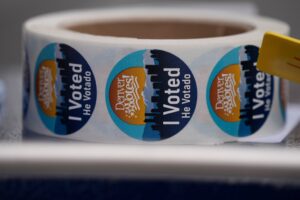Denver voters appear poised to keep the 155-acre former Park Hill Golf Club property as a green space, at least for now, unofficial election results released Tuesday night show.
Initiated Ordinance 301 was passing with roughly 63.2% of the vote according to preliminary results released shortly after 7 p.m. That number is based on 64,866 ballots being counted out of the more than 467,000 the city mailed out this year.
The ordinance bans any new commercial construction on a property covered by a city-owned conservation easement without Denver voters approving it first. The Park Hill course, located east of Colorado Boulevard between East 35th and East 40th avenues, is the only property in Denver covered by a city-owned easement.
The course is owned by developer Westside Investment Partners. After buying the land in 2019, the company announced it was looking to redevelop it into a mixed-use micro-neighborhood with housing and business space.
In an effort to get around the city-wide vote bar set by Ordinance 301, Westside put forth its own measure on this year’s ballot, Initiated Ordinance 302.
That ordinance is nearly identical to 301 but would create a carveout explicitly excluding the golf course from the vote requirement.
Early returns Tuesday night show 302 was being rejected, with 61.5% of voters casting their ballots against it with 13.7% of the total ballots counted.
Supporters of 301, including former mayor Wellington Webb, cast the choice between the two measures as choosing open space vs. more development and concrete in a city that has seen rapid redevelopment over the last decade plus.
“We believe that open space is a precious and very finite resource,” 301 supporter Tony Pigford said in the runup to the election. “With the climate crisis on everybody’s doorstep, I think forward-thinking cities develop open space as a last resort not the first.”
Some neighbors rejected the idea that the golf course would best serve the community as park space. The neighborhood, which is predominantly nonwhite, has suffered from decades of being ignored by economic interests and needs more entry-level housing and business opportunities, LaMone Noles, who lives just south of the course, said during campaign season.
With 301 poised to win out over its rival measure, it is unclear what is next for the property. The city conservation easement dictates that it must remain a “regulation-length, 18-hole daily fee public golf course” with any additional uses only allowed if they don’t interfere.



















